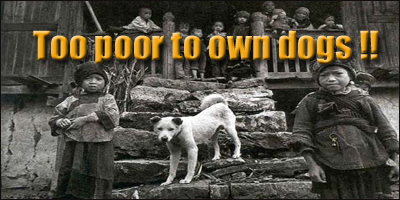Welfare recipients in China told they can't afford the luxury of owning pets
 |
|
by China Internet Information Center If you can afford to raise a dog, you don't need welfare. That's the controversial argument that has stirred heated debate around the country over the last several months, with both the central government and various city authorities jumping into the debate. Earlier this week, the Ministry of Civil Affairs issued a statement saying it is acceptable for welfare recipients to raise pets. But the central government doesn't decide who is eligible for payments and who isn't, and those who do decide often consider pet dogs the type of expensive luxury that proves a family doesn't need financial help from outsiders. In some cities, the rules are clear. Nanjing, for instance, issued a regulation in March saying dog owners are ineligible for public subsidies. In Shanghai, however, the rules change depending on which neighborhood you live in. Families living under the poverty line in Shanghai -- meaning those with a monthly income below 290 yuan (US$35) per member -- can apply to their neighborhood committees for a government subsidy of up to 290 yuan a month. But different committees have different thoughts on whether or not the poor should own a pooch. "As the subsidy is granted to people living under the poverty line, it is certainly improper for subsidy recipients to have an extravagant living style, such as raising pets," said Liu Biqing, a local resident. If they can afford to feed their pets, they don't need help to survive, Liu said. Many local residents and committee members share that view, noting that it costs 2,000 yuan (US$241.92) a year to license a dog. By the end of last year, Shanghai was home to 89,000 licensed pet dogs and even more unlicensed canines. Many neighborhood committees in the city won't approve subsidies for families owning "expensive properties" such as cell phones, motorcycles and some pets. "Sometimes, some jobless people with extravagant possessions will come to us to apply for financial assistance, but they are usually immediately rejected," said Xu Yonghong, a local neighborhood committee official. Others in the city, however, say dogs shouldn't be considered a luxury item. "Living is a larger concept than just survival," said Ma Qianfeng, a psychologist at Fudan University. "It is natural for people living below the poverty line to have some psychological needs, such as raising pets." Some poverty-stricken seniors would rather skip a meal here and there, he said, than part with their furry companion. Xia Jianmin, an official with the Shanghai Civil Affairs Bureau, said the decision to grant a subsidy should be made on a case-by-case basis. "As situations vary a lot and it is too difficult for us to define what kind of pets are extravagant," he said. "The only criteria we should stick to is whether the family's monthly income is really below the city's poverty line." Currently, about 400,000 families in the city receive monthly subsidies. ------------------------------------------------------------------------ |



